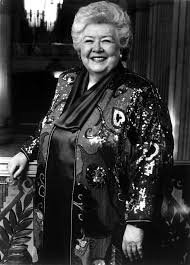Some anecdotes from the backstage front lines (so to speak) of opera in the US in the 1980s.
I served on an NEA opera/music theater panel with two larger than life women, Beverly Sills and Ardis Krainik. Beverly at that time ran the New York City Opera, and Ardis (a beautiful soul) ran the Chicago Lyric.
At one point they got in an argument. Beverly said it wasn’t possible to sell tickets to contemporary opera, Ardis said it was. Beverly was adamant. I thought Ardis was right. Because if she could sell them, they could be sold.
I didn’t say that, figuring it was smarter not to get in the middle of this. Especially because I thought the real difference between the two experiences was the companies’ marketing clout.
The Chicago Lyric did monster marketing. In the 1990s, they were famous (at least in the field) for selling 103% of their tickets, meaning that they sold out everything, and then resold tickets subscribers couldn’t use.
Sold out everything means they even sold out contemporary works. I talked to a marketer there, who said they had a list of everyone who bought tickets to new or 20th century operas, and if the company wasn’t selling out a production of one, they’d phone these people — literally dial them on the phone — and get them to come.
Not every institution, putting it mildly, is that enterprising.
A contrast with that
At the Met, a marketing director there told me (I think in the ‘80s) that he didn’t mind if Wozzeck sold only 50%. Overall, he said, they were selling 92%, and that was good enough for him. If the artistic people, he said, wanted to do operas that wouldn’t sell, he’d accept that, again because his overall numbers were good.
He only wished, he said, that they’d schedule Wozzeck for times when many European tourists were in town. American tourists, he said, wouldn’t buy tickets to Wozzeck, but Europeans would. And the Met does a fair business, selling tickets to tourists. (They’ve even put billboards in Times Square, tourist central in New York.)
Four dollars extra
I think it was in the ‘70s that another Met marketing director told me how he’d imposed a $4 handling charge for mail and phone ticket orders. (No Internet back then.)
There was no reason for the charge. Except for make four extra dollars on each order. Only once, this man told me, did anyone object to the charge, and they cheerfully refunded it.
Stories like these should be in histories that should be written about classical music in recent decades in America. I think it’s uncommon for such things to surface, because in the background of much writing on classical music institutions is the unspoken thought that classical music is special, has to be supported, protected.
We then don’t get the down and dirty details that are part of any human story. And so we don’t know what really went on.
Which it’s important to understand, in an age when classical music has long been in crisis. What’s the cause of the crisis, how bad is it, how are we dealing with it? Hard to answer this question if we don’t know all the facts.


As the chairman of a major teaching chamber music festival, I can assure readers that contemporary composers do sell. Our artistic directors began three years ago to program contemporary composers (some of whom come visit and teach) at almost all of our regular concert series of 21 summer concerts. Whether it is correlation without causation I cannot say and I have to note that there are many factors at play; but, we are now selling out nearly every concert. This has not happened in the more than 50 year history of the festival. And, our young musicians are thrilled to play something new and exciting. Despite fears and handwringing on the part of many, audience reaction to contemporary compositions has been excellent. All the proof I need is to look at the seating chart and see not one seat available.
Thanks, Eliot. It’s happening in opera, too, and there’s far less resistance among orchestra audiences. I was talking about things that happened decades ago, and didn’t think to add a contemporary perspective! Thanks for your information, and for reminding me that I should have included current info.